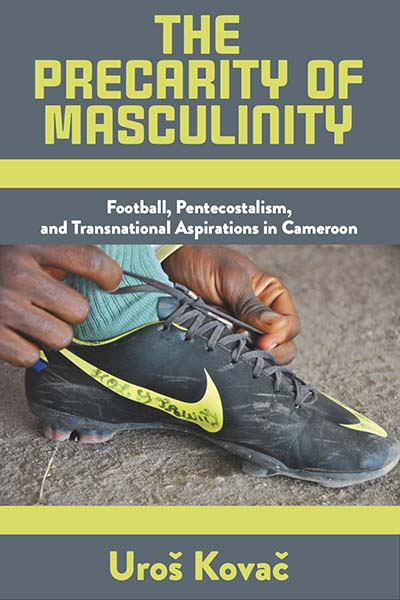“The author has not only written one of the few anthropological accounts exploring the relations between neoliberalism, Pentecostalism, masculinity, and the commercialization of professional sports, but also refutes too easily made assumptions about a crisis of masculinity affecting societies on the African continent and elsewhere.” • Journal of the Royal Anthropological Institute
“By connecting football and Pentecostalism, Kovač offers a compelling account of Cameroonian masculinity as it is lived, practiced, and imagined… [His] work stands as a significant contribution to the study of masculinity in Africa. By connecting football and Pentecostalism—two realms often compartmentalized in African studies – The Precarity of Masculinity demonstrates how young men who face enormous uncertainties and harsh moral evaluations, construct and reconstruct masculine identities through moral work.” • Tudschrift Voor Genderstudies
“The book uses Cameroon as a case study to shed light on a global phenomenon, namely on how young men try to gain respect and therefore find their place in society through negotiating their masculinities. It is thus able to offer readers interested in gender, place, and culture a nuanced understanding of what it means to be a young man in a place marked by structural insecurities… [It] is eloquently written, whilst also being easily accessible to a broad audience.” • Gender, Place & Culture (Journal of Feminist Geography)
“A key observation of Kovač’s book is about the sorts of persons footballers must become under the conditions of global aspiration and economic precarity, which combine in a classic instance of ‘cruel optimism’. Kovač pays particular attention to the appropriation of ‘suffering’ as a narrative through which these men not only articulate their marginality, but also their capacity to endure and overcome.” • Africa (Journal of the International African Institute)
“Overall, the book is a very exciting journey into one of the shadiest corners of the global football industry… [It] is an important analytical contribution to the fields of sports science, ethnography, and other disciplines focusing on contemporary postcolonialism, the global economy, and young masculinities. It contains an impressive breadth in its research overview as well as a clarifying depth in its analysis.” • idrottsforum.org (Nordic Sport Science Forum)
“The Precarity of Masculinity is a compelling work that explores the lives and aspirations of young footballers with deep nuance and insight, while reflecting on broader resonances relating to issues of youth and masculinities in Cameroon and other places on the margins of the global political economy. The ethnography opens up a refined, yet accessible reflection on these issues in a universal and existential register, fittingly approached through what is undoubtedly the most globalized sport. • Ethnos (Journal of Anthropology)
“This work is a welcome contribution to the growing body of anthropology of African sports. It touches on many aspects, manifestations and dynamics of global football industry in west Africa – especially the geopolitical relations, transnational aspirations, and spiritual practices. … [It] will serve as an excellent resource for courses in African studies, international relations and anthropology.” • Canadian Journal of African Studies
“This is an extraordinarily high-quality book, destined to make a mark in Africanist scholarship. Simply by demonstrating the connection between football and Pentecostalism in Cameroon, Kovač’s manuscript takes a step I have never seen before, examining a kind of confluence of two global movements into a local production of masculine subjects.” • Sasha Newell, Université libre de Bruxelles, author of The Modernity Bluff: Crime, Consumption, and Citizenship in Cote D'Ivoire
“Tells the fascinating story of young Cameroonians, who opt for football as a career to bring them global mobility and attain what the author calls ‘moral masculinity’ … The story is full of unexpected turns, bringing in a wide array of aspects and actors.” • Peter Geschiere, University of Amsterdam, author of The Perils of Belonging: Autochthony, Citizenship, and Exclusion in Africa and Europe
“This is a richly documented and convincingly theorized ethnographic study … It captures the interconnections and intricacies of global and local hierarchies that produce and shape social realities, as well as individual and collective aspirations under neoliberalism … The history and role of football in the region, articulated around the theme of precarity and the various moral orders that compete in shaping the young men and their expectations of self-fulfillment, are convincingly pursued and well substantiated.” • Francis B. Nyamnjoh, University of Cape Town, author of #RhodesMustFall: Nibbling at Resilient Colonialism in South Africa
Since the 1990s, an increasing number of young men in Cameroon have aspired to play football as a career and a strategy to migrate abroad. Migration through the sport promises fulfillment of masculine dreams of sports stardom, as well as opportunities to earn a living that have been hollowed out by the country’s long economic stalemate. The aspiring footballers are increasingly turning to Pentecostal Christianity, which allows them to challenge common tropes of young men as stubborn and promiscuous, while also offering a moral and bodily regime that promises success despite the odds. Yet the transnational sports market is tough and unpredictable: it demands disciplined young bodies and introduces new forms of uncertainty. This book unpacks young Cameroonians' football dreams, Pentecostal faith, obligations to provide, and desires to migrate to highlight the precarity of masculinity in structurally adjusted Africa and neoliberal capitalism.
Uroš Kovač is a Marie Skłodowska-Curie Postdoctoral Fellow at the University of Groningen, Faculty of Religion, Culture and Society. He is a social anthropologist researching gender, migration, religion and development, often through the prism of sports in Africa.
LC: GV944.C17 K68 2022
BISAC: SOC002010 SOCIAL SCIENCE/Anthropology/Cultural & Social; SPO066000 SPORTS & RECREATION/Cultural & Social Aspects; REL079000 RELIGION/Christianity/Pentecostal & Charismatic


